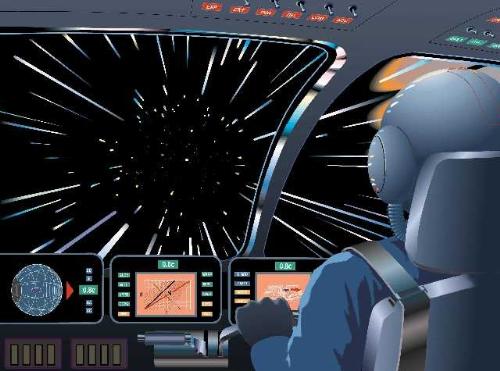Speed of light
By liviucrl
@liviucrl (25)
Romania
7 responses
@pcbulawanv (680)
• Austria
7 Dec 06
At the moment, i think it is very impossible. But in the future, i think there is a chance for human beings to be able to reach the speed of light. Scientists are constantly making studies and researches to reach that goal. I think they wont stop until they can get it. That is actually one of the ultimate goals of science. Reaching a speed of light would be a brakthrough and Im sure it can help humans to reach other planets. This will enable us to visit far places in the space and reach far planets and other constellations. Interesting.
@mx_aman (2101)
• India
8 Mar 07
I thinks it's not possible...
Recalling the very famous second postulate of Special Relativity declared by Einstein (1905): "The velocity c of light in vacuum is the same in all inertial frames of reference in all directions and depend neither on the velocity of the source nor on the velocity of the observer". Einstein's theory of special relativity says that the speed of light in vacuum is always the same (at 299,792.458 km/s) but this is true only for systems that are inertial, which means not accelerating. From Newton's second law: if forces exist implies acceleration exists; this means that special relativity is valid only when no forces are acting; thus it cannot be used when there is a gravitational force present. Albert Einstein himself emphasized this in his paper written in 1917: "The results of the special relativity hold only so long as we are able to disregard the influence of gravitational fields on the phenomena". Therefore for the results of special relativity to hold the systems should not be accelerating (no gravitational forces).
In 1915 (10 years after special relativity) Einstein developed another theory called General Relativity that deals with gravitational fields and according to this latest theory the velocity of light appears to vary with the intensity of the gravitational field. For example, an observer outside gravitational fields measures the speed of light locally (in his location) at 299792.458 km/s but when he looks towards a black hole he sees the speed of light there to be as slow as a few meters/sec. At the same time an observer freefalling into that black hole (zero-g) measures the speed of light locally (in his location) at 299792.458 km/s; when he looks towards the black hole he sees the speed of light there much slower; when he looks away from the black hole he sees the speed of light there much faster. If he tries to resist his freefall into that black hole (by firing his rockets for example) he will not measure the speed of light locally anymore at 299792.458 km/s; instead the stronger the g-force that he feels the faster light appears to him. Again when he looks towards the black hole he sees the speed of light there much slower; when he looks away from the black hole he sees the speed of light there much faster. In any case, freefalling or not, he will never see the speed of light outside gravitational fields at 299792.458 km/s. Finally, there is no difference between the effects of g-forces experienced from these rockets and the effects of g-forces experienced when standing on planets, stars... hence an observer standing on a black hole measures the speed of light locally (in his location) much faster than 299792.458 km/s; when he looks towards outside gravitational fields he sees the speed of light there a zillion km/s.
@tarachand (3895)
• India
10 Jan 07
I think the there are ways around the limit to speed of light as per relativity. Already existance particles that travel faster that light have been postulated - "Tachyons". Maybe tomorrow (far into the furure or maybe just tomorrow?) it my be possible to tarvel faster than light? I am optimistic.
@Sandy100 (141)
•
18 Dec 06
I do not think that a way will ever be developed to travel at the speed of light, the laws of physics won't allow it. I do still think that space travel may still be possible on day though, possibly through the explotation of worm hole type phenomona.
@sreedhar (576)
• India
11 Jan 07
Nothing is impossible for we human beings. It was einstein itself who said that it is impossible to cross the speed of light( i.e. matter changes into energy at the speed of light), but he himself has hypothesised that if we can travel with speeds more than speed of light we can do time travel. this only shows how eager he was to see others disprove his own theory and go beyound it.
Now itself scientists have found an nice plan to do this. According to them, black holes revolve with very high speeds, so if we can manage to enter into them and revolve with low speeds, still to a person outside it will look as if we are travelling with more than the speed of light. What is your opinion about this?
@abhinavkumar1987 (177)
• India
10 Jan 07
No as the Theory Of Relativity limits the maximum speed achievable.So no way the humanity will ever develop the machine to travel at more than the speed of light.











